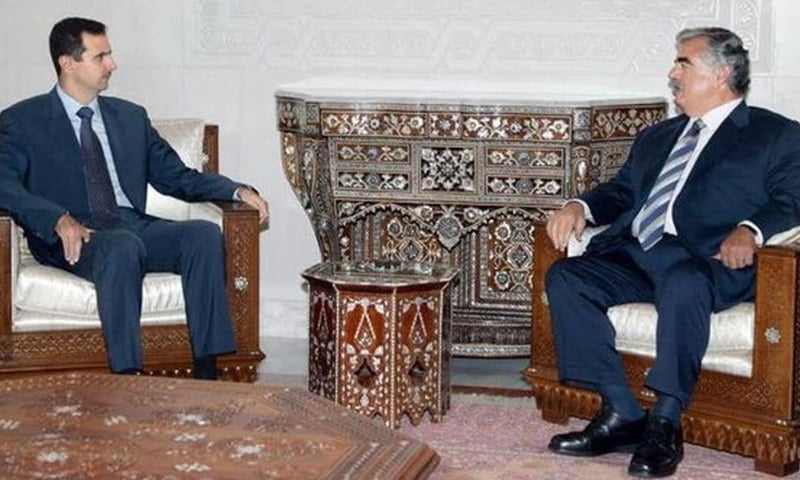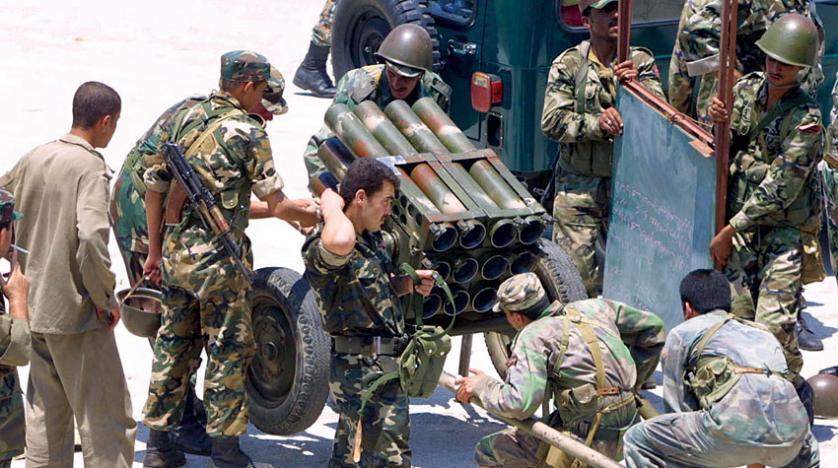In his memoirs in Asharq Al-Awsat, former Syrian Vice President Abdel Halim Khaddam revealed aspects of what happened behind the scenes regarding his country’s relations with Lebanon, including details of President Bashar Al-Assad’s decision to extend Lebanese President Emile Lahoud’s term and the contacts that took place at that time with the late Lebanese Prime Minister Rafik Hariri to persuade him to agree to the extension. He pointed out that he advised Rafik Hariri to quickly leave Lebanon and resign from abroad, according to Asharq Al-Awsat newspaper, which quoted Khaddam’s memoirs.
Regarding the extension of General Emile Lahoud, Khaddam stated that Lebanese public opinion is divided. “There is an overwhelming majority opposed to the extension and a minority supporting it, in addition to comprehensive international rejection of the extension issue,” he said. This rejection was reinforced by a meeting between the American President George Bush and the French President Jacques Chirac in June 2004, during which they unequivocally denounced the extension of President Lahoud and the Syrian intervention in Lebanese affairs. Khaddam further noted that the opposition to the extension has expanded on a Lebanese, Arab, and international level, accompanied by calls for an end to Syrian intervention in Lebanon and the withdrawal of Syrian forces.
Describing the situation in a critical tone, the former Syrian official expressed his perspective, stating, “It was clear to me that any irrational attitude towards the regime in Syria would cause significant damage to the country. Therefore, in all my meetings with Dr. Bashar Al-Assad, I tried to convince him of the danger of the extension, especially after the intense pressure he exerted on Lebanese Prime Minister Rafiq Hariri. He summoned him in July, in the presence of General Ghazi Kanaan, Brigadier Rustam Ghazaleh, and Colonel Mohammed Khalouf. The harshness of the speech led to Hariri experiencing high pressure and nosebleeding.”
He said, “That morning, I had an appointment with Dr. Bashar. When I went to him, he was excited and nervous. He said, ‘I met with Rafiq Hariri at 7:30 am. I spoke to him clearly and directly in the presence of officers. I informed him that it is not permissible to work on the arrival of a president of the republic. I am the one who chooses, and anyone who disagrees with me will face consequences.'”
Khaddam commented, “I was taken aback by his words. I said to him, ‘What have you done? You are addressing the Prime Minister of Lebanon, who represents Muslims in Lebanon. Have you considered the repercussions of your words if they were to spread? Have you thought about the consequences of such remarks? We have worked for many years to establish the role of the Prime Minister and the Speaker of Parliament, and you are undermining that role by supporting Emile Lahoud. It is not in your interest. Why would you address the Prime Minister in the presence of these officers? What is the benefit for you and the country in diminishing the role of the Prime Minister or the Speaker of Parliament?’ He calmed down and said, ‘I will invite President Hariri to visit you, and I will mitigate the consequences of our meeting.’ I responded, ‘I will do that.'”
He continued his account of the events during that period, saying, “Indeed, I called President Hariri on the phone and expressed my disappointment that he came to Damascus without contacting me. I told him, ‘I am expecting you to visit Damascus within a few days.’ He replied, ‘My conditions were very bad, so I didn’t reach out to you. After this visit, I will not visit Damascus.’
The former Syrian Vice President stated that he had a lengthy discussion with Hariri. “By the end of the discussion, he was convinced to visit me in Bludan (near Damascus). Indeed, I received him on Thursday. He shared with me what had happened to him. He was injured. He said, ‘I will never forget my meeting with Bashar Al-Assad as long as I live.’ I intervened and interrupted him, saying, ‘You are a political figure. You should not take things personally. When he spoke to you, he was emotional. I met with him on the day of your meeting. He talked to me about the matter, and I sensed that he was hurt by his emotions. I told him to take it easy.’ In fact, with that conversation, I tried to ease the tensions between him and Dr. Bashar Al-Assad.”
Khaddam spoke of another occasion, noting, “On August 18, 2004, I met with President Al-Assad to bid farewell to him as I traveled to France for my annual medical examinations. During that meeting, we discussed the extension of General Lahoud’s term. I asked him, ‘How did this matter arise?’ He replied, ‘I have decided not to extend it. No one in the world agrees to it, and even the Arab countries are against it. Most Lebanese are opposed as well. I made it clear to President Lahoud that we have no intention of extending his term.’ The man knew our position clearly.”
He said he commented on President Bashar Al-Assad, saying, “I hope no one tries to change your position. You cannot bear the consequences of the extension, and Syria cannot bear the potential repercussions. He replied, ‘I have been firm with President Lahoud on this matter. I called him and expressed my decision.'”
Khaddam continued narrating these events from his perspective, noting, “After a few days, while I was in France, President Hariri called me and informed me that Dr. Bashar had changed his opinion regarding the extension and summoned him to Damascus. The meeting was brief. Assad was agitated. He informed Hariri that he decided to support the extension for General Lahoud. He also told him, ‘You need to determine your position: are you with or against Syria? Take your time to think it over and let me know your decision to approve or reject.'”
In his call to me, President Hariri continued, “I seek your advice.” I asked him, “Have you met with Walid Jumblatt? What was his opinion?” He answered, “I met him, and he advised me to agree to the extension and then resign.” I told him, “You cannot bear the consequences of rejecting the extension. Walid’s advice is correct. It is better to agree, leave Lebanon, and announce your resignation from abroad.”
The former Syrian Vice President elaborated on several subsequent developments and reported conversations that occurred behind the scenes. On one occasion, he commented, “Many questions arose at the time: Why did Dr. Bashar Al-Assad change his decision to support the extension of General Lahoud? Then, why did he change his decision again to not extend Lahoud’s term and mediate with Spain? After five hours, he reversed his decision and returned to supporting the extension for General Lahoud. Was it due to pressure from those close to him who had significant interests in Lebanon? Or was it related to matters concerning the security services in Lebanon, which are partners in the security system? Or perhaps it was a result of personal emotions triggered by situations of fear and hesitation that influenced his decision?”


